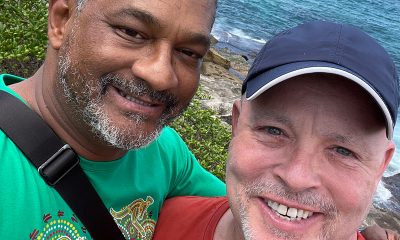Local
New D.C. Council member backs same-sex marriage
Sekou Biddle wins appointment to at-large seat

Ward 4 school board member Sekou Biddle, who won an interim appointment to the D.C. City Council Thursday night, says he’s a strong supporter of LGBT rights, including same-sex marriage.
Biddle, 39, beat former City Council member Vincent Orange (D-Ward 5) and four other Democratic candidates who competed for the interim appointment before the 80-member D.C. Democratic State Committee, which makes interim Counsel appointments.
“I support same-sex marriage,” Biddle told the Blade after the vote. “I think it’s an indication of the kind of city that we have. It’s what makes us, in my opinion, a top-flight, world-class city that we have that level of respect for human and civil rights.”
Biddle will face off against Orange and other candidates expected to enter the race from all political parties in a special city-wide election scheduled for April 26.
He was expected to take office immediately in his temporary Council appointment for a seat made vacant after Council member Kwame Brown (D-At-Large) won election as City Council Chairman.
Before getting elected to the school board, Biddle began his career as a classroom teacher for eight years. He later served in leadership positions in education advoacy organizations, including his current post as executive director of the group Jumpstart.
Thursday night’s vote by the State Committee came after each of the candidates spoke before the committee and an overflowing crowd that gathered in a meeting room at the Democratic National Committee headquarters on Capitol Hill.
The Gertrude Stein Democratic Club, the city’s largest LGBT political group, endorsed Biddle in his race for the school board, where he has served since 2007.
Three Stein Club members who also are members of the D.C. Democratic State Committee endorsed and campaigned for Biddle in his quest for the committee’s appointment. The three are Jeffrey Richardson, the Stein Club president; Lateefah Williams, the club’s vice president for legislation and political affairs; and Alexandra Beninda, the club treasurer.
He also received the endorsement of Brown, who beat Orange in the hotly contested race in November for the Council chair race. At least three other Council members – Mary Cheh (D-Ward 3), Harry Thomas (D-Ward 5), and Marion Barry (D-Ward 8) also endorsed Biddle.
Mayor Vincent Gray remained neutral in the contest but some of his top political operatives backed Biddle. This prompted many political observers to conclude that the city’s political establishment had shifted its support from Orange – who was considered the frontrunner just two weeks ago – to Biddle.
Orange came out strongly against same-sex marriage during his unsuccessful race for mayor in 2006. When he ran against Brown for the Council chair seat last year he announced he had changed his position to support the city’s same-sex marriage law. But he was less clear about whether he would support or oppose holding a voter initiative seeking to overturn the marriage equality law, which took effect last March.
It took three rounds of voting for Biddle to nail down his victory over Orange Thursday night. With 74 of the 80 State Committee members present to vote, Biddle won on the third round by a vote of 40 to 31. Three ballots cast by committee members were disqualified because they voted for one of the other candidates that were eliminated after the first round of voting.
Only Biddle, Orange and candidate Stanley Mayes, a Ward 1 political activist, received any votes in the six-candidate race.
Many of the observers at the State Committee meeting were looking toward gay Council member David Catania (I-At-Large) as a possible predictor of what might happen in the April special election.
Catania stunned the city’s political establishment in 1997 when, running as a Republican, he defeated Democratic frontrunner Arrington Dixon in a special election to win his at-large Council seat.
Just 7 percent of the city’s registered voters turned out for the special election. But gays and Republican voters turned out in force, giving Catania his margin of victory over Dixon, a former City Council chairman who some observers said was overly complacent in his campaign.
Catania won re-election to a full term the following year and has retained his seat since that time. He withdrew from the Republican Party in 2004 to become an independent after the GOP and President George W. Bush embraced a constitutional amendment to ban same-sex marriage.
Some local political pundits say pro-gay Republican Patrick Mara, who won election in November to the school board from Ward 1, could be the next “Catania” in the April special election. With a low voter turnout and support from Republicans and gays, among other groups, Mara supporters say he has a shot at winning. He has yet to announce whether he plans to run, although insiders believe he will enter the race.
Catania unofficially backed Mara when Mara ran against and defeated former Republican Council member Carol Schwartz two years ago in the Republican primary. Mara lost the general election to Democrat turned independent Michael Brown in the general election. As a friend of Mara’s, some observers are wondering if Catania will throw his support and political organization behind Mara, with the possibility of Mara coming out ahead if Biddle and Orange split the Democratic vote.
Some gays, including David Mariner, executive director of the D.C. LGBT community center, backed Orange in last year’s council chair race, saying Orange has come around to support LGBT issues and was more qualified as an attorney and accountant to address the city’s budget and economic development issues. Mariner said he has yet to decide whom to support in the April special election.
Ben Young, a spokesperson for Catania, said Catania has no comment at the present time on the upcoming Council special election and the potential candidates that might run in the race.
Richardson of the Stein Club said the comparison between Catania and Mara would not likely apply in this year’s special election because Biddle is expected to run a vigorous campaign and line up support from large numbers of gay voters.
Like Biddle, Mara supports same-sex marriage and has expressed strong support for all other LGBT-related issues.
Biddle told the Blade Thursday night that his political ties to the LGBT community are strong.
“In terms of politics and endorsements, I got my start in the LGBT community,” he said. “When I ran in 2007 for the Board of Education, the Stein Club was the first one to endorse me, and that gave my candidacy a lot of momentum and visibility. I’ve built a solid relationship since I’ve been in office and I think a level of trust.”
He said he considers himself a “progressive” on a wide range of city issues and hopes to draw support from all sections of the city.
West Virginia
Appeals court strikes down W.Va. transgender athlete ban
Ruling finds law violates students’ constitutional rights, Title IX
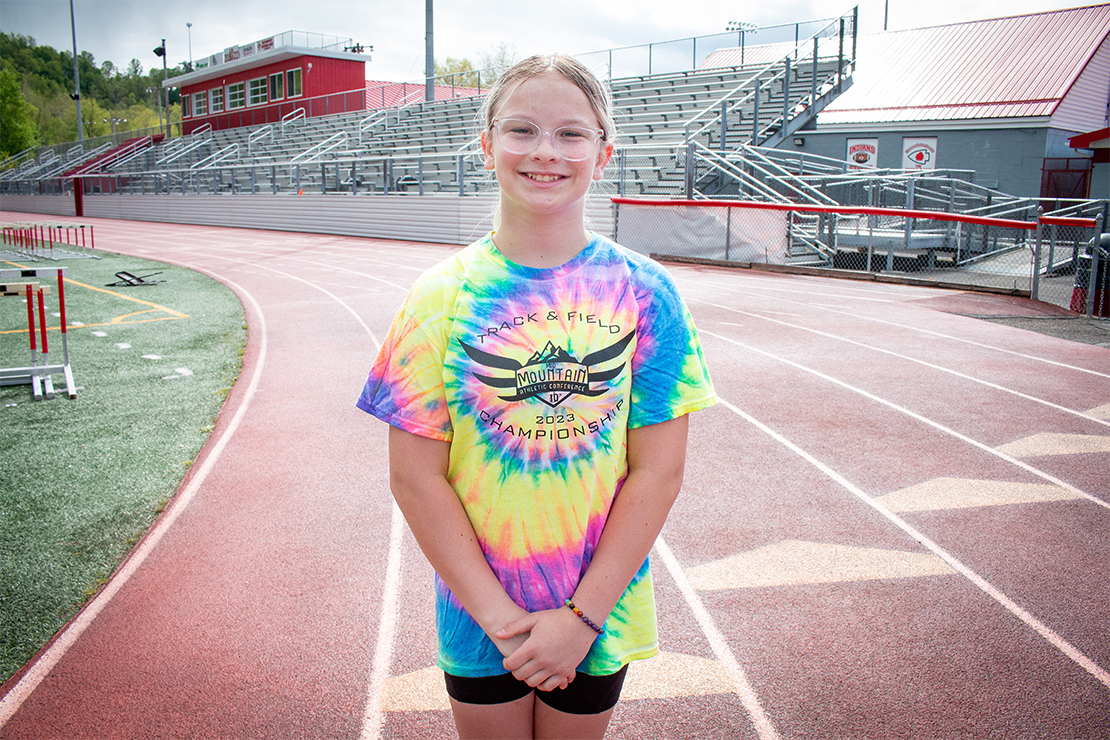
BY LORI KERSEY | The 4th U.S. Circuit Court of Appeals has struck down West Virginia’s ban on transgender athletes, finding the law violates trans students’ rights under the Equal Protection Clause of the constitution and Title IX, a federal civil rights law prohibiting discrimination based on sex in education programs.
The case, B.P.J. vs. the West Virginia Board of Education, was filed in May 2021 on behalf of Becky Pepper-Jackson, a 13-year-old trans middle school student and track athlete who would be barred from participating if the ban is upheld. Pepper-Jackson is represented by the American Civil Liberties Union, the American Civil Liberties Union of West Virginia and Lambda Legal.
In April 2021, West Virginia Gov. Jim Justice signed into law a bill prohibiting trans women and girls in the state from participating in sports that align with their gender identity. The U.S. Court of Appeals in February 2023 blocked the state from removing Pepper-Jackson from her school’s track and field team as legal advocates appealed a lower court’s ruling upholding the ban.
In Tuesday’s ruling, Judge Toby Heytens wrote that offering Pepper-Jackson the “choice” between not participating in sports and participating only on boys teams is not a real choice.
“The defendants cannot expect that B.P.J. will countermand her social transition, her medical treatment, and all the work she has done with her schools, teachers and coaches for nearly half her life by introducing herself to teammates, coaches and even opponents as a boy,” the judge wrote.
“By participating on boys teams, B.P.J. would be sharing the field with boys who are larger, stronger, and faster than her because of the elevated levels of circulating testosterone she lacks,” he wrote. “The Act thus exposes B.P.J. to the very harms Title IX is meant to prevent by effectively ‘exclud[ing]’ her from ‘participation in’ all non-coed sports entirely.”
In a statement Tuesday, Joshua Block, senior staff attorney for the ACLU’s LGBTQ and HIV Project, called the court’s ruling “a tremendous victory for our client, transgender West Virginians and the freedom of all youth to play as who they are.”
“It also continues a string of federal courts ruling against bans on the participation of transgender athletes and in favor of their equal participation as the gender they know themselves to be,” Block wrote. “This case is fundamentally about the equality of transgender youth in our schools and our communities and we’re thankful the 4th Circuit agreed.”
“We hope today’s ruling sends a message of hope to the trans youth of West Virginia,” Aubrey Sparks, legal director of the ACLU of West Virginia, said in the statement. “And a message of warning to politicians who continue to dehumanize this vulnerable population.”
West Virginia is one of 21 states that have banned trans student-athletes over the last three years, according to the ACLU.
In a statement Tuesday, West Virginia Attorney General Patrick Morrisey vowed to defend the ban and said he is “deeply disappointed” in the decision.
“The Save Women’s Sports Act is ‘constitutionally permissible’ and the law complies with Title IX,” Morrisey said. “I will keep fighting to safeguard Title IX. We must keep working to protect women’s sports so that women’s safety is secured and girls have a truly fair playing field. We know the law is correct and will use every available tool to defend it.”
******************************************************************************************

Lori Kersey is a reporter with a decade of experience reporting in West Virginia. She covers state government for West Virginia Watch.
******************************************************************************************
The preceding article was previously published by the West Virginia Watch and is republished with permission.
Nonprofit, nonpartisan, independent journalism not hidden behind a paywall. Mountaineers are always free, and so is West Virginia Watch.
West Virginia Watch is part of States Newsroom, the nation’s largest state-focused nonprofit news organization.
District of Columbia
Reenactment of first gay rights picket at White House set for April 17
Event marks 59th anniversary of historic push for gay rights in nation’s capital
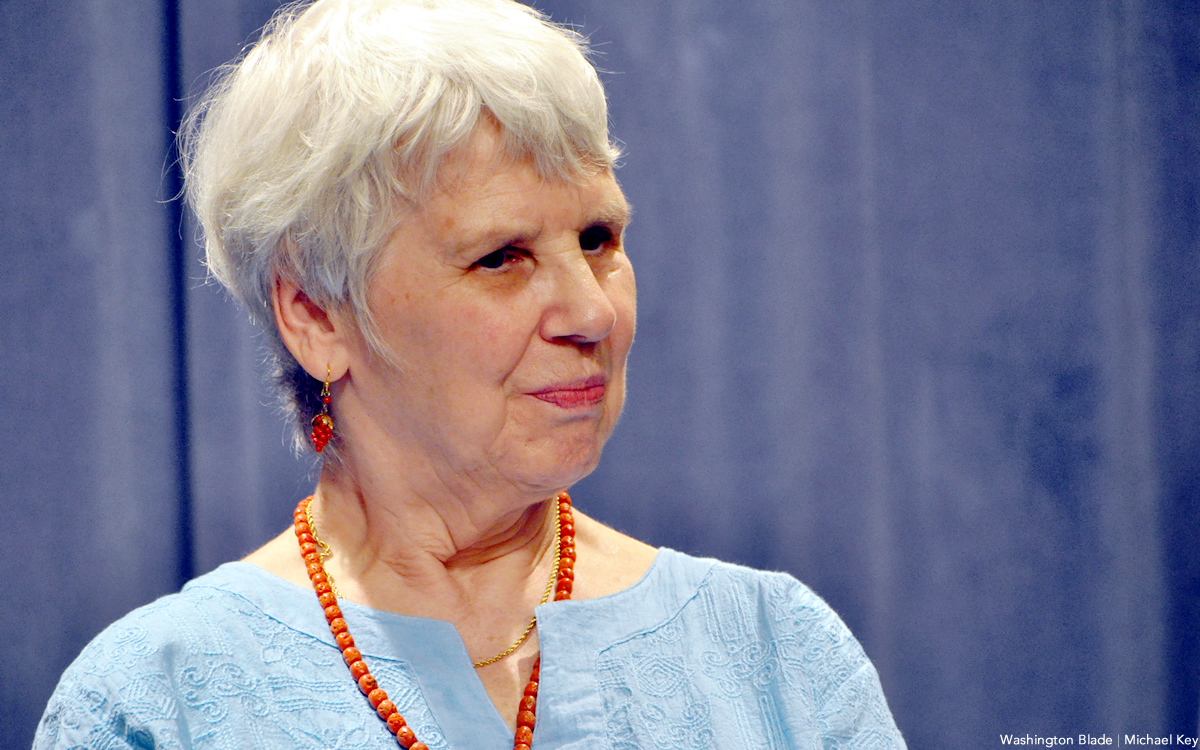
D.C.’s Rainbow History Project announced it will hold a reenactment on Wednesday, April 17, of the historic first protest for gay rights in the form of a picket line in front of the White House that took place on that same day in 1965.
In a statement released last week, Rainbow History Project says the reenactment will mark the 59th anniversary of an event that is credited with bringing attention for the first time to the federal government’s longstanding discrimination against a minority group referred to then as homosexuals or gays and lesbians.
The statement notes that the 1965 event was organized by the Mattachine Society of Washington, D.C., the first politically active LGBT organization in the nation’s capital founded by local gay rights pioneer Frank Kameny.
“The picket took place on the White House sidewalk, Lafayette Park, 1600 Pennsylvania Ave., on April 17, 1965,” the statement says. “For exactly one hour, from 4:20 p.m. to 5:20 p.m., members of the Mattachine Society of Washington walked in a circle, non-stop, in silence, carrying posters of their demands,” the statement continues.
“The White House picket is the origin story for public demonstrations for gay rights in the U.S., and the origin story for Pride Marches and the annual LGBTQ Pride celebrations which occur across the globe,” according to the statement.
It says those picketing in the April 1965 event, which included Kameny and longtime local D.C.-area lesbian activist Lilli Vincenz, both of whom held doctorate degrees, called on the government to adopt the Mattachine Society of Washington’s four major demands: an end to the exclusion of homosexuals from federal government employment; an end to the ban on gays and lesbians from serving in the U.S. military; an end to the “blanket denial” of security clearances for gay people; and an end to the “government refusal to meet with the LGBTQ community.’
Among those who chose not to respond to the request for a meeting was President Lyndon B. Johnson, who occupied the White House at the time of the 1965 picketing.
Vincent Slatt, the Rainbow History Project’s director of archiving and one of the lead organizers of the April 17 reenactment event, said the event is aimed, among other things, at drawing attention to how far the LGBTQ community has come since 1965. He said the event is not in any way a protest of the administration of President Joe Biden and Vice President Kamala Harris, who Slatt called staunch supporters of the LGBTQ community.
“We are just reenacting this historical event and pointing out how far we’ve come,” Slatt told the Washington Blade. “If you think about what it means in 1965 when these people were protesting and LBJ would not even respond to them. And now, we are at a place where Vice President Harris speaks on a stage at Capital Pride.”
The Rainbow History Project statement notes that the reenactment event will also be held in honor of Kameny, who died in 2011, and Vincenz, who passed away in 2023, both of whom participated in a similar reenactment event in 2008.
Among those who will be participating in this week’s reenactment on April 17 will be longtime local LGBTQ rights activist Paul Kuntzler, who is the only known surviving person who was among the White House picketers at the April 1965 event. Kuntzler will be carrying a replica of his own picket sign he held at the 1965 event, the statement says.
It says Rainbow History Project volunteers will also carry replicas of the original protest signs and hand out literature explaining the picket to passersby and tourists.
Similar to the 1965 event, the reenactment picketing at the White House will begin on April 17 at about 4:15 p.m., according to Slatt of the Rainbow History Project.
District of Columbia
Four LGBTQ candidates running for delegate to Democratic National Convention from D.C.
Thirty-two candidates competing for 13 elected delegate positions in April 20 party caucus
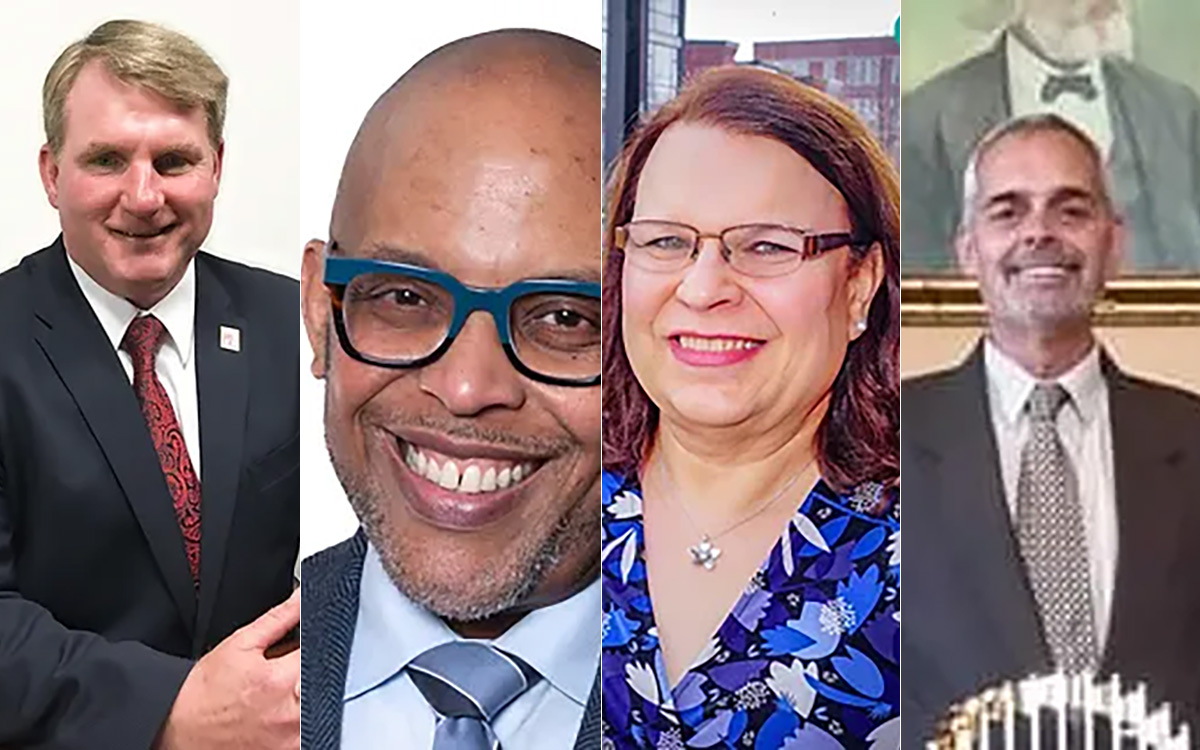
Four LGBTQ Democratic Party activists are running for election as delegates from D.C. to the Democratic National Convention at an April 20 local Democratic Party caucus election in which all D.C. voters who are registered as Democrats will be eligible to vote.
The four LGBTQ candidates are among 32 candidates competing for just 13 elected delegate positions. D.C. will have a total of 51 delegates to the Democratic Convention, but the other 38 include elected officials and party leaders who are considered “automatic” or appointed delegates. The convention will be held in Chicago Aug. 19-23,
Under the delegate selection process put in place by the D.C. Democratic Party, six of the thirteen elected delegate positions will be elected by voters in a section of the city designated as District 1, which includes Wards 1,2, 6, and 8. The other seven elected delegates will be chosen by voters in District 2, which includes Wards 3, 4, 5, and 7.
The LGBTQ candidates include longtime gay Democratic activists David Meadows of Ward 6 and John Fanning of Ward 2 who are running in District 1. Transgender rights advocate and Democratic Party activist Monika Nemeth of Ward 3 and gay Democratic activist Jimmie Williams of Ward 7 are running in District 2.
All four of the LGBTQ candidates have been active members of the Capital Stonewall Democrats, one of D.C.’s largest LGBTQ political organizations. Nemeth and Meadows are past presidents of the organization. Williams has served as chair of the Ward 7 Democratic Committee and is a current member of the committee. Fanning has served as an elected member of the D.C. Democratic State Committee from Ward 2 and served as a delegate to the 2016 Democratic National Convention.
A total of 12 candidates are running in each of the two districts. Under party rules the highest six vote getters in District 1 and the highest 7 vote getters in District 2 will be declared the winners.
The Saturday, April 20 caucus election for the delegate candidates will take place at the Walter E. Washington D.C. Convention Center. An announcement by party officials says two voting sessions will take place, one from 10:00 a.m. to 2:00 p.m. and the other from 4:00 p.m. to 8:00 p.m.
Aside from the elected delegates, two prominent D.C. LGBTQ Democratic leaders will be appointed as delegates to the 2024 Democratic National Convention in their role as members of the Democratic National Committee from D.C.
They are Claire Lucas, a highly acclaimed Democratic Party and LGBTQ rights advocate and party fundraiser; and Earl Fowlkes, one of the lead organizers of D.C.’s annual Black LGBTQ Pride celebration and former president of Capital Stonewall Democrats.
Lucas and Fowlkes and the four LGBTQ candidates running in the April 20 caucus election are committed to backing President Joe Biden as the Democratic nominee for re-election.
Statements from each of the candidates running for delegate in the April 20 caucus election, including the four LGBTQ candidates, can be accessed here: Candidates for Delegate | DC Democratic Party
-

 Africa2 days ago
Africa2 days agoCongolese lawmaker introduces anti-homosexuality bill
-

 Colorado4 days ago
Colorado4 days agoFive transgender, nonbinary ICE detainees allege mistreatment at Colo. detention center
-

 Politics4 days ago
Politics4 days agoFirst lady warns Trump is ‘dangerous to the LGBTQ community’ at HRC event
-
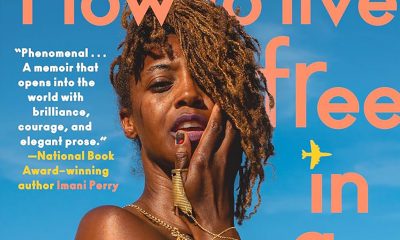
 Books4 days ago
Books4 days agoNew book offers observations on race, beauty, love



